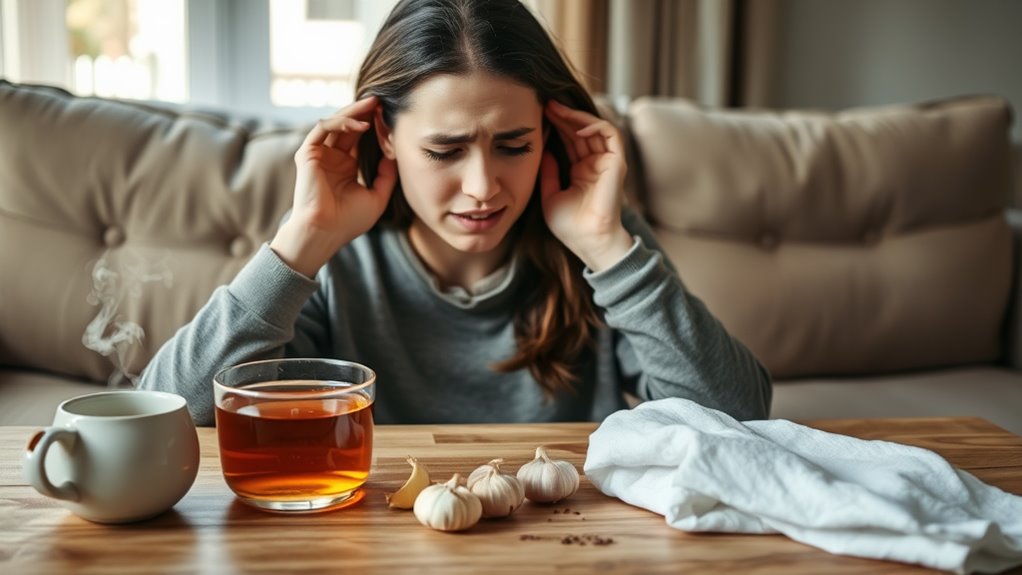Earache Remedies Kids Can Try Safely at Home
When your six-year-old wakes up at midnight clutching their ear in pain, you’ll want quick, safe solutions to ease their discomfort. While childhood earaches can leave both parents and kids feeling frustrated and helpless, several proven home remedies can offer immediate relief. From simple kitchen ingredients to proper sleeping positions, you’ll find multiple ways to soothe your child’s ear pain while deciding if a doctor’s visit is necessary.
Understanding Common Causes of Childhood Earaches
When your child complains of ear pain, it’s often due to one of several common causes that affect young children more frequently than adults.
Middle ear infections (otitis media) are the most common trigger, typically occurring after a cold or respiratory infection. Fluid buildup behind the eardrum creates pressure and discomfort. Warm compress therapy can provide quick pain relief while waiting for a doctor’s appointment.
Swimming, changes in altitude during air travel, or even wax accumulation can also cause earaches.
Before trying earache remedies at home, it’s important to understand that ear pain can also stem from teething in babies, sinus infections, or throat infections that radiate to the ears.
Warm Compress and Temperature Relief Methods
A warm compress offers one of the safest and most effective ways to soothe your child’s ear pain at home. When you’re dealing with your little one’s earache, temperature-based relief can provide quick comfort and help reduce inflammation.
-
Hold a clean, warm washcloth against your child’s affected ear for 10-15 minutes.
-
Use a heating pad set to low, but never let your child fall asleep with it.
-
Try store-bought microwaveable compress packs designed specifically for kids.
-
Alternate between warm and cool compresses if your child prefers one temperature over the other.
Remember to check the temperature on your wrist first to prevent burns.
Simple Over-the-Counter Pain Relief Options
Several over-the-counter medications can effectively manage your child’s ear pain, with acetaminophen and ibuprofen being the most common choices.
For children under 12, always use the children’s formula and follow the age-appropriate dosing guidelines on the package.
You’ll need to check your child’s weight and age to determine the correct dose.
Don’t give aspirin to children under 16, as it’s linked to Reye’s syndrome.
If you’re unsure about proper dosing, consult your pediatrician or pharmacist.
Remember to wait the full recommended time between doses and keep a log of when you’ve given medication. Additionally, these medications can be complemented with natural remedies such as warm compresses to provide more comfort and relief.
Natural Remedies From the Kitchen Cabinet
Many common kitchen ingredients can provide safe, natural relief for your child’s earache. These time-tested remedies can help manage pain while waiting to see the doctor.
-
Warm a small amount of olive oil to body temperature and place 2-3 drops in the affected ear.
-
Create a warm compress using a clean washcloth and salt heated in a pan.
-
Mix equal parts apple cider vinegar and warm water to make ear drops.
-
Place a few drops of warm garlic oil in the ear canal for its natural antimicrobial properties.
In addition, antimicrobial properties in coconut oil can also help combat infection, providing further support in home remedies.
Always test temperature first and stop if discomfort occurs.
Rest and Position Techniques for Comfort
Three simple positioning techniques can help your child find relief from ear pain during rest periods.
First, elevate your child’s head with an extra pillow to promote better drainage from the ear canal.
Second, position your child on the non-affected side, with the painful ear facing up to assist natural drainage.
Third, keep your child’s head upright during waking hours rather than letting them lie flat.
These positions work best when combined with adequate rest.
Guarantee your child gets plenty of sleep, as this helps their body fight infection and reduces discomfort naturally. Additionally, ensuring a proper sleep hygiene routine can enhance overall recovery.
When to Seek Professional Medical Help
While most earaches resolve on their own within a few days, you should contact your child’s doctor immediately if your child develops a high fever over 102.2°F (39°C), experiences severe pain, or shows signs of discharge from the ear.
Watch for these additional warning signs that require prompt medical attention:
- Stiff neck or difficulty moving the head
- Persistent symptoms lasting more than 3 days despite home treatment
- Swelling, redness, or tenderness behind or around the ear
- Changes in hearing, balance, or facial movements
Don’t hesitate to trust your parental instincts – if you’re worried about your child’s condition, it’s better to have them checked by a healthcare provider.







